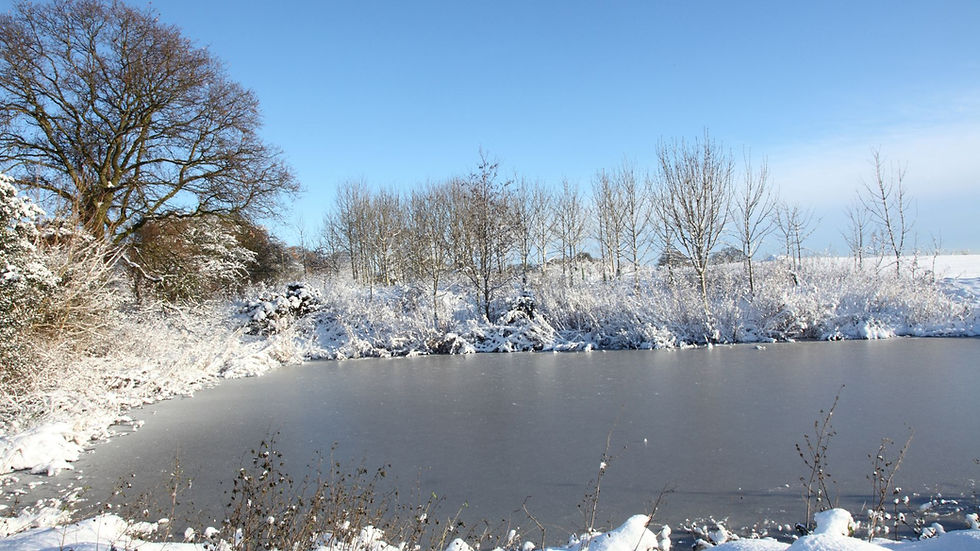Can I Have a Pond Without a Filter?
- Richard Fulford

- May 25, 2023
- 6 min read
Updated: Jun 26, 2023
Exploring the Viability of a Filter-Free Garden Pond

Creating a garden pond is akin to crafting a miniature aquatic paradise. The gentle glisten of sunlight on the water's surface, the delicate rustle of aquatic plants, and the graceful movements of aquatic life can transform an ordinary outdoor space into a serene oasis.
As you embark on the journey of pond ownership, a fundamental question arises: Can a pond thrive without the assistance of a filter? In this blog article, we delve into the depths of this query and examine the concept of maintaining a filter-free pond while considering the practical implications and benefits.
Can I have a Pond without a Filter? Blog outline:
1. The Advantages of a Pond Without a Filter.
The freedom of going filter-free! Here's why some pond enthusiasts choose to take the road less filtered:
Embracing Nature's Balance
When you opt for a pond without a filtration system, you entrust nature's delicate balance to maintain the health and clarity of your aquatic oasis. Creating a self-sustaining ecosystem allows nature to showcase its remarkable ability to regulate and cleanse the water. It's a fascinating journey where plants, microorganisms, and aquatic life form an intricate web of interactions harmonising your pond. A self-regulating pond ecosystem often enables the absorption of excess nutrients by plants while beneficial bacteria decompose organic matter, fostering an environment conducive to the thriving of aquatic inhabitants.
Cost-Effectiveness
One of the appealing aspects of maintaining a pond without a filter is its cost-effectiveness. Filters, particularly high-quality ones, can be a significant investment, with costs varying depending on the size and complexity of your pond. By eliminating the need for a filter, you can allocate your resources towards other aspects of your pond, such as selecting unique plant varieties, adding decorative features, or expanding the overall size of your aquatic haven.
Simplified Maintenance
One of the joys of a filter-free pond is the simplified maintenance routine it entails. Without a filter, you eliminate the need for regular filter cleaning and replacement, reducing the time and effort required to keep your pond in optimal condition. Instead, you can devote your attention to other aspects of pond upkeep, such as tending to the plants, ensuring proper water circulation, and monitoring the ecosystem's overall health. With fewer equipment-related tasks on your to-do list, you can spend more leisurely moments enjoying the serenity of your pond.
2. The Considerations of Foregoing a Filter.
While maintaining a filter-free pond brings its own set of advantages, it's essential to acknowledge the potential challenges that may arise in maintaining optimal conditions within the pond:
Water Clarity Challenges
Unwanted Turbidity
Without the aid of a filter, there is a higher likelihood of experiencing turbidity, which refers to cloudy or hazy water. Turbidity can occur due to various factors, including suspended particles, algae blooms, and excess nutrients.
The Accumulation of Unfiltered Debris
Fallen leaves, twigs, and other organic matter can find their way into the water in a filter-free pond. If left unattended, this debris can accumulate and negatively impact water clarity.
Balancing Nutrient Levels
Nutrient imbalances can contribute to water clarity challenges, particularly by fueling excessive algae growth. Finding the right balance within the pond ecosystem becomes crucial without a filter to assist in nutrient removal.
Limitations on Fish and Wildlife Options
While many fish species can adapt to various water conditions, some thrive better in enhanced filtration and oxygenation environments. Fish that are particularly sensitive to water quality or have specific requirements may not be suitable for a filter-free pond. Factors to consider include:
Oxygen levels - some fish species, such as koi or certain types of goldfish, benefit from high levels of dissolved oxygen. A filter helps to aerate the water and maintain optimal oxygenation. If you have a specific fish species in mind, ensure that your pond's oxygen levels meet their needs.
Water clarity preferences - clearer water is preferred by some fish species to thrive and exhibit their vibrant colours. A filter can assist in maintaining water clarity by removing particulate matter and improving overall water quality. It may be beneficial if you desire fish with stunning visual appeal.
Biodiversity - a filter-free pond may impact the diversity of wildlife that chooses to inhabit it differently. While frogs, dragonflies, and other fascinating creatures are often attracted to ponds, they may be deterred by murkier water conditions. A filter can help maintain water clarity, creating a habitat that attracts a broader range of wildlife.
3. Tips for Filter-free Pondkeeping.
For those leaning towards the filter-free route, consider these valuable tips to navigate garden pond waters without filtration systems:
Harness the power of aquatic plants.
Aquatic plants play a pivotal role in the success of a filter-free pond, providing aesthetic beauty and serving as nature's allies in maintaining water quality and creating a thriving ecosystem. They are renowned for their ability to oxygenate the water and absorb excess nutrients, making them invaluable assets in a filter-free pond. Through the process of photosynthesis, plants release oxygen, ensuring a healthy oxygen balance for fish and other aquatic organisms. Additionally, they absorb carbon dioxide, a byproduct of respiration, helping maintain the water's pH balance.
Did you know that the root systems of aquatic plants play a crucial role in filtration and water clarity? As water passes through the roots, it encounters a dense network of fine root hairs, which act as natural filters, trapping suspended particles, organic matter, and sediments. By reducing the presence of these particles in the water column, aquatic plants contribute to improved water clarity and create a healthier environment for aquatic organisms.
Embrace the Art of Balance
Maintaining a harmonious and balanced ecosystem in your filter-free pond requires understanding the delicate interplay between various factors. Regularly testing water nutrient levels, adjusting plant quantities, and utilising natural remedies when needed are essential practices to promote equilibrium.
Testing the nutrient levels in your pond allows you to gauge the balance and make informed decisions regarding plant quantities and potential interventions. Periodically perform water tests using readily available kits to assess levels of nitrogen, phosphorus, and other essential nutrients.
By monitoring nutrient concentrations, you can identify any imbalances that may contribute to excessive algae growth or hinder the overall health of your pond. Testing provides valuable insights into the dynamic nature of your ecosystem, enabling you to take appropriate action when necessary.
For example, if nutrient levels are higher than desired, introducing or enhancing the presence of nutrient-absorbing aquatic plants can help mitigate the excess. These plants, such as water hyacinths or hornwort, have rapid growth rates and efficiently absorb nutrients, restoring the ecosystem's balance.
On the other hand, if nutrient levels are relatively low or certain plant species dominate the pond, selectively thinning out overgrown plants can create space and resources for other species to thrive. This practice ensures that each plant has access to sufficient nutrients and prevents the ecosystem from becoming imbalanced.
Utilise natural remedies as needed.
In some cases, natural remedies can address specific challenges in your pond. These remedies work harmoniously with the ecosystem, providing gentle interventions that help maintain equilibrium. Consider the following options:
Barley straw
Barley straw has long been used as a natural method to control algae growth. As the straw decomposes, it releases compounds that inhibit algae growth, thus promoting clearer water. Always place bales of barley straw in strategic locations within your pond to maximise their effectiveness.
Beneficial bacteria additives
Introducing beneficial bacteria into your pond can enhance the natural breakdown of organic matter, such as excess nutrients and decaying vegetation. These bacteria help establish a healthy microbial balance, reducing the risk of water quality issues and promoting a thriving ecosystem.
It's important to note that while natural remedies can be effective, they should be used judiciously and in accordance with recommended guidelines. Overuse or improper application may disrupt the delicate balance of your pond, so exercise caution and seek guidance if needed.
Implement regular maintenance rituals.
Regular maintenance rituals are the cornerstone of keeping your filter-free pond in optimal condition. These rituals involve a range of tasks that help preserve water quality, manage plant growth, and ensure your pond's overall health and beauty. Include skimming and debris removal, running and thinning of aquatic plants, water quality monitoring, seasonal cleanups, and regularly observing your pond as an integral part of maintenance.
4. Can I have a Pond without a Filter? Summary.
So, can you have a pond without a filter? Yes, you can have a pond without a filter. It's a voyage into a natural, unfiltered world of pond keeping. However, it's essential to understand the challenges you may face and the extra efforts required to maintain water clarity and harmony. Whether you choose the filter or filter-free route, may your pond be a sanctuary of tranquillity and natural beauty, where water and life dance in perfect harmony.
Seek Professional Guidance
If you're still uncertain about whether a pond filtration system is necessary for your pond after reading this blog, it's highly recommended to reach out to a local garden pond specialist.
If you live in Midhurst and surrounding areas, contact FishLife - your local pond expert with specialised knowledge and experience in pond management that can provide expert advice tailored to your specific pond's needs.
With their guidance, you can decide whether a filtration system is necessary to achieve optimal balance and maintain a healthy and vibrant pond ecosystem. Contacting FishLife is a valuable step towards ensuring the long-term success of your pond and experiencing the utmost enjoyment from your aquatic haven.
You might be interested in the following:





Comments